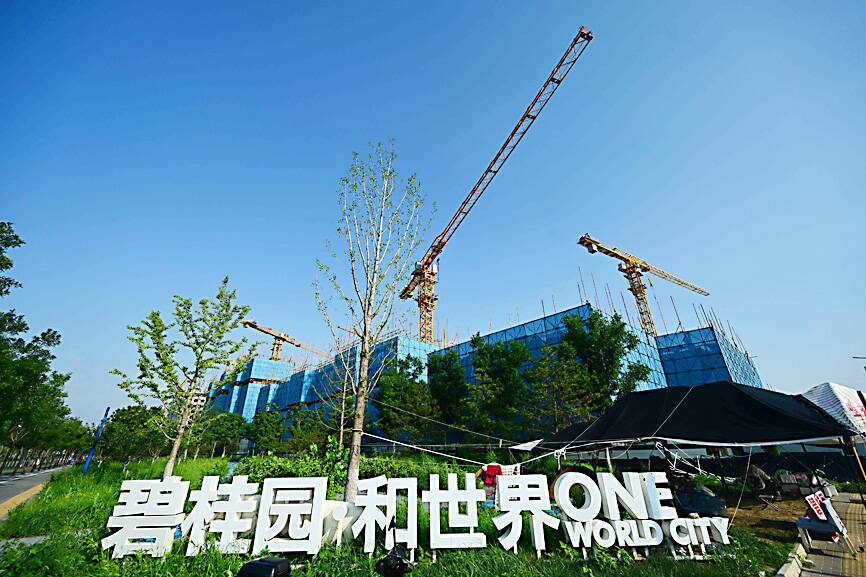The risks of Taiwanese financial firms’ NT$1.12 trillion (US$35.12 billion) exposure to China are controllable, despite growing debt woes in the world’s second-largest economy, the Financial Supervisory Commission (FSC) said on Tuesday.
Concerns about debt contagion in China have risen after Zhongzhi Enterprise Group Co (中植企業), which managed about 1 trillion yuan (US$138 billion) of assets, this week missed payments on multiple high-yield investment products.
In addition, property giant Country Garden Holdings Co (碧桂園), which had racked up about 1.4 trillion yuan in liabilities as of the end of last year, and faces 7.8 billion yuan in payments on notes and bonds next month, on Monday suspended 11 of its onshore bonds.

Photo: AFP
Taiwan’s banking, insurance, and securities and futures industries have no exposure to Zhongzhi Enterprise Group, the commission said.
As for Country Garden Holdings, there are only 22 professional investors who are clients of five Taiwanese banks that have bonds issued by the Chinese property developer, totaling NT$170 million, while one local bank reported US$9.02 million in loans to the firm, the commission said.
As of the end of June, the three major financial industries reported aggregate exposure of NT$1.12 trillion to China, with the banking industry having a combined exposure of NT$1.01 trillion, followed by NT$94.7 billion by the insurance industry and NT$15.73 billion by the securities and futures industry.
In the banking industry, lending to China was NT$697.4 billion at the end of June, with investments in the Chinese market totaling NT$237.4 billion and interbank loans totaling NT$75.4 billion, the commission said, adding that total exposure to China accounted for 23.91 percent of the industry’s net worth.
Exposure to China in the local banking industry and the ratio of exposure to net worth dipped to the lowest level since the commission started recording the data in the third quarter of 2013, it said.
The declines were evidence that the risks from exposure remained controllable, it said.
In the insurance industry, exposure to Chinese marketable securities totaled NT$94.7 billion at the end of June, down 5.02 percent from a year earlier, with the investments all by life insurance companies, it said.
No investments were reported by property insurers, it added.
In the securities and futures industry, exposure totaled NT$15.73 billion as of the end of June, with investments by Taiwanese securities firms totaling NT$12.79 billion, the largest contribution in the industry, it said.
The exposure among securities firms was NT$3.88 billion in business investments and NT$8.9 billion from proprietary securities firms, it said.
In addition, exposure from securities investment trust firms and futures merchants was NT$2.69 billion and NT$251 million respectively, it added.

PROTECTION: The investigation, which takes aim at exporters such as Canada, Germany and Brazil, came days after Trump unveiled tariff hikes on steel and aluminum products US President Donald Trump on Saturday ordered a probe into potential tariffs on lumber imports — a move threatening to stoke trade tensions — while also pushing for a domestic supply boost. Trump signed an executive order instructing US Secretary of Commerce Howard Lutnick to begin an investigation “to determine the effects on the national security of imports of timber, lumber and their derivative products.” The study might result in new tariffs being imposed, which would pile on top of existing levies. The investigation takes aim at exporters like Canada, Germany and Brazil, with White House officials earlier accusing these economies of

Teleperformance SE, the largest call-center operator in the world, is rolling out an artificial intelligence (AI) system that softens English-speaking Indian workers’ accents in real time in a move the company claims would make them more understandable. The technology, called accent translation, coupled with background noise cancelation, is being deployed in call centers in India, where workers provide customer support to some of Teleperformance’s international clients. The company provides outsourced customer support and content moderation to global companies including Apple Inc, ByteDance Ltd’s (字節跳動) TikTok and Samsung Electronics Co Ltd. “When you have an Indian agent on the line, sometimes it’s hard

‘SACRED MOUNTAIN’: The chipmaker can form joint ventures abroad, except in China, but like other firms, it needs government approval for large investments Taiwan Semiconductor Manufacturing Co (TSMC, 台積電) needs government permission for any overseas joint ventures (JVs), but there are no restrictions on making the most advanced chips overseas other than for China, Minister of Economic Affairs J.W. Kuo (郭智輝) said yesterday. US media have said that TSMC, the world’s largest contract chipmaker and a major supplier to companies such as Apple Inc and Nvidia Corp, has been in talks for a stake in Intel Corp. Neither company has confirmed the talks, but US President Donald Trump has accused Taiwan of taking away the US’ semiconductor business and said he wants the industry back

PROBE CONTINUES: Those accused falsely represented that the chips would not be transferred to a person other than the authorized end users, court papers said Singapore charged three men with fraud in a case local media have linked to the movement of Nvidia’s advanced chips from the city-state to Chinese artificial intelligence (AI) firm DeepSeek (深度求索). The US is investigating if DeepSeek, the Chinese company whose AI model’s performance rocked the tech world in January, has been using US chips that are not allowed to be shipped to China, Reuters reported earlier. The Singapore case is part of a broader police investigation of 22 individuals and companies suspected of false representation, amid concerns that organized AI chip smuggling to China has been tracked out of nations such